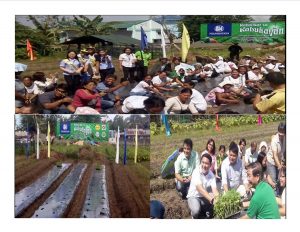
The Sustainable Livelihood Program (SLP) of DSWD FO 02 continues to harness support from different partners to empower its program-participants to improve their socio-economic status through livelihood opportunities.
Thus, it is grateful for the new convergence project which was launched on July 7, 2015, the Kabalikat sa Kabuhayan Farmers’ Training Program at Isabela State UIniversity, Cauayan City, Isabela.
The said program is a high-value crop training program that aims to impart knowledge on new organic farming technologies to SLP program-participants who are small-scale farmers like the Pantawid Pamilya and SLP farmer beneficiaries.
Around 65 program-participants will stand to benefit from this convergence efforts of DSWD, Isabela State University-Cauayan Campus, SM Foundation, Department of Agriculture, Harbest Agribusiness Corporation and the Local Government Unit of Cauayan City, Isabela.
Under the program, partners from Harbest Agribusiness Corporation will provide lecture and skills training on new organic farming technologies to SLP program-participants while SLP will equip participants on its Community Driven Enterprise Development (CDED) approach so that they will be equipped to actively contribute to production and labor markets by looking at available resources and accessible markets.
Meanwhile, SM Foundation will finance the training costs and for its part, the Local Government Unit of Cauayan City assured the participants of any support that they may need throughout the course of the training and the seedlings to be provided by the Department of Agriculture.
The said training will be conducted at the Isabela State University-Cauayan Campus which pledged for the free use of the demo farm for the participants.
SLP is implemented through two tracks: Micro-enterprise Development and Employment Facilitation. The Micro-enterprise Development track supports micro-enterprises in becoming organizationally and economically viable, whereas the Employment Facilitation track assists participants to access appropriate employment opportunities. Both tracks are executed based on the Community-Driven Enterprise Development (CDED) approach. ### By: GELA FLOR R. PEREZ, Regional Information Officer II

